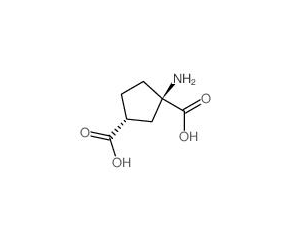
(±)-trans-ACPD
CAS No. 67684-64-4
(±)-trans-ACPD( trans-ACPD )
Catalog No. M17567 CAS No. 67684-64-4
(±)-trans-ACPD is an equimolecular mixture of (1S, 3R)- and (1R, 3S)-ACPD. (±)-trans-ACPD is a selective agonist of the mGluR (metabotropic glutamate receptor).
Purity : >98% (HPLC)
 COA
COA
 Datasheet
Datasheet
 HNMR
HNMR
 HPLC
HPLC
 MSDS
MSDS
 Handing Instructions
Handing Instructions
| Size | Price / USD | Stock | Quantity |
| 2MG | 51 | In Stock |


|
| 5MG | 82 | In Stock |


|
| 10MG | 135 | In Stock |


|
| 25MG | 264 | In Stock |


|
| 50MG | 478 | In Stock |


|
| 100MG | 691 | In Stock |


|
| 200MG | Get Quote | In Stock |


|
| 500MG | Get Quote | In Stock |


|
| 1G | Get Quote | In Stock |


|
Biological Information
-
Product Name(±)-trans-ACPD
-
NoteResearch use only, not for human use.
-
Brief Description(±)-trans-ACPD is an equimolecular mixture of (1S, 3R)- and (1R, 3S)-ACPD. (±)-trans-ACPD is a selective agonist of the mGluR (metabotropic glutamate receptor).
-
Description(±)-trans-ACPD is an equimolecular mixture of (1S, 3R)- and (1R, 3S)-ACPD. (±)-trans-ACPD is a selective agonist of the mGluR (metabotropic glutamate receptor); active at the group I/II mGlu receptors (EC50: 2/15/23/800 μM, mGluR2/1/5/4).
-
In VitroExcitatory amino acid (EAA) analogues activate receptors that are coupled to the increased hydrolysis of phosphoinositides (PIs). In these studies, hippocampal slices are prepared from neonatal rats (6-11 days old) to characterize the effects of EAA analogues on these receptors. The concentrations of trans-ACPD required to evoke half-maximal stimulation (EC50 value) is 51 μM. DL-2-Amino-3-phosphonopropionate (DL-AP3) is also equipotent as an inhibitor of PI hydrolysis stimulated by ibotenate, quisqualate, and trans-ACPD (IC50 values are 480-850 μM).
-
In VivoIntrathecal injection of NMDA, kainate, and trans-ACPD, TNF-α, or IL-1β causes significant (p<0.001) biting behaviour in mice compared to animals injected intrathecally with saline. In all groups, systemic pre-treatment with GM (100 mg/kg, i.p.) significantly (p<0.001) reduces the biting behaviour compared to mice treated with saline (10 mL/kg, i.p.). The greatest effect of GM is observed on the pro-inflammatory cytokines and NMDA, with the following inhibition percentages: TNF-α (92±7%), IL-1β (91±5%), NMDA (69±1%), and trans-ACPD (71±12%). By contrast, at the same dose, GM has no significant effect on the kainate-mediated biting response.
-
Synonymstrans-ACPD
-
PathwayOthers
-
TargetOther Targets
-
RecptorCalcium Channel
-
Research AreaMetabolic Disease
-
Indication——
Chemical Information
-
CAS Number67684-64-4
-
Formula Weight173.17
-
Molecular FormulaC7H11NO4
-
Purity>98% (HPLC)
-
SolubilityH2O : 6.2 mg/mL. 35.80 mM;
-
SMILES[C@@]1(C[C@H](CC1)C(=O)O)(C(=O)O)N
-
Chemical Name(±)-1-Aminocyclopentane-trans-1,3-dicarboxylic acid
Shipping & Storage Information
-
Storage(-20℃)
-
ShippingWith Ice Pack
-
Stability≥ 2 years
Reference
1.Conti P,et al.Synthesis and pharmacology of 3-hydroxy-delta2-isoxazoline-cyclopentane analogues of glutamic acid.Farmaco. 2002 Nov;57(11):889-95.
molnova catalog



related products
-
Eα (52–68)
Eα (52–68)
-
Diphenylamine Hydroc...
Diphenylamine Hydrochloride is a natural product that used mainly for its antioxidant properties.
-
T22
T22



 Cart
Cart
 sales@molnova.com
sales@molnova.com


